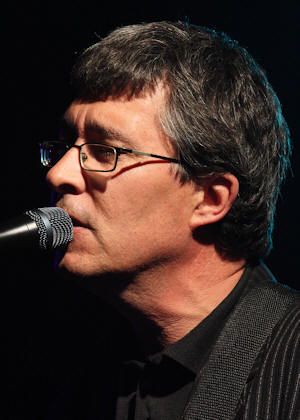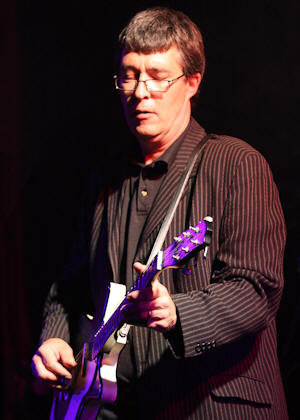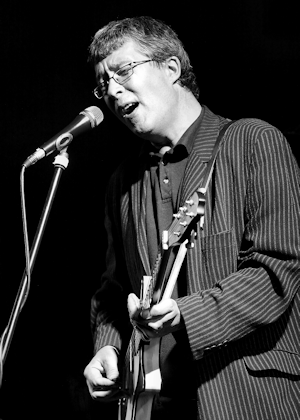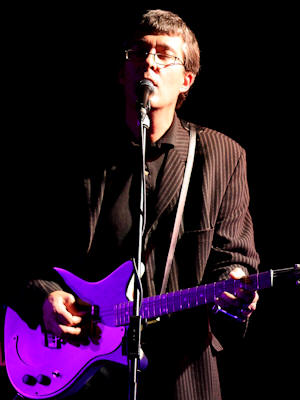
Painting © 2004 Loz
Arkle
Website
© Copyright 2000-2011 Alan White - All
Rights Reserved
Site optimised for Microsoft Internet Explorer



Early Blues Interview
|
|
Recently reformed after an 8 year absence - The Producers, fronted by
Harry Skinner on guitar & vocals & Big Dave Saunders on bass won
the top UK
Blues Band over 4 consecutive years before going their separate ways in
2002. Now they're back. Harry & Dave still front the band ably assisted
by Ray Drury on Hammond & Biff Smith on drums. They went down a storm at
the Carlisle Blues Festival in 2009 and I caught up with them again at the
Blues N'Booze Festival 2010 at The Box, Royal Hotel, Crewe.
Harry: My earliest musical memory is of The Beatles ‘Michelle’ on the Radio (1965) I am a little surprised that I don’t remember anything earlier though I do remember my mum playing the piano. During the following years the constant stream of great music coming out of my elder brother’s bedroom (particularly Taj Mahal and Otis Redding) impacted on me. The record that really woke me up was ‘Stay with me’ by the Faces. The blues thing didn’t come along for me until much later when I was in my late 20s early 30s. This wasn’t because I hadn’t heard the music but it just didn’t mean anything at the time. Circumstances arose that put me into contact with my elder brother’s record collection again and the big moment was hearing Elmore James doing ‘The Sun is Shinin’ on the album ‘Tough’ (a double with John Brim on the other side). The penny dropped at that point and I became a little obsessive for a while. Alan: Did you always want to become a musician? Harry: I think the answer is yes. I left school at 16 and joined an army band so that I could learn and play music all day everyday for money. It turned out to be a good decision, I worked as an oboist for seven years and had the chance to work on my guitar and piano skills too. I also came into contact with other, more accomplished players, and learnt a good deal about a wide variety of music. Alan: How did you get started in music? Harry: As I said above the musical progress kind of started in the army though I played piano and variety of other instruments at school (Cello, Flugel Horn and a bit of flute too). I got my first guitar at the age of 12 (my birthday) while we were on holiday in Spain. I was actually inspired by Val Doonican and the Johnny Cash stuff that my dad liked, so I taught myself songs from the TV. I had a guitar teacher for a while, she gave me Alan Lomax’s book of blues music as a present when we finished working together and it was some 25 years later that I realised what a fantastic gift it was. I also had a few lessons on fingerpicking by a friend of the family, these have been lessons that changed my playing for ever. I wrote a lot of songs and became rather fixated on playing only my own stuff. In the end this was very creative but I have the feeling that it slowed my progress down really. Partially because I was always writing from a limited knowledge and underdeveloped technique. I learnt electric guitar (my first one was from Woolworths) through working out ‘Dark Side of the Moon’ and Alice Cooper records and anything else that took my fancy at the time and then got into forming a band (Rock) which I went on to become a band called ‘The Manitou'. This had several incarnations and eventually toured Japan and in Europe. It was a great, original band. Ultimately at about the age of 38 I decided to go back to school and study music at College and University.
Harry: When ‘the Producers’ first started we were playing standards (still play many of them). I was (and am) particularly keen on Howlin’ Wolf. It was mixed up with 60s material (Small Faces, Doors etc) always with one foot in the Blues from my point of view. When I started writing stuff for the band it was really a way of taking ownership of a genre that was obviously odd for a middle class white English boy, the inspiration came from learning about early Fleetwood Mac and the British Blues Boom bands. I am really interested and excited by the way that British bands of that period found their own way of doing these things (even though their quest might have been a seeking for authenticity). Alan: What first attracted you to the blues? Harry: When the penny dropped I realised that it was all about the feeling. There had been a number of occasions where I had become lost in the experience of playing but when that Elmore James record hit me for the first time I sat there as a listener (and not a player) and cried. Circumstances were such that it all suddenly made sense. I was attracted to the blues because as a player there is potential in the music to feel those feelings (in performance) and ideally the power of that can be seen and heard by an audience. In the end the choice is entirely selfish, I want to feel like I did that first time, every time. It seems to me that the simple structure of the blues frees you to concentrate on where you want to be in terms of expression at the time. Alan: Who has influenced you the most in your music writing and playing? Harry: Ideas come from all sorts of places. Recently I have been kicking around an idea that borrows heavily on the sound of Ali Farke Toure. Peter Green and Tampa Red are two blues names of influence that come to mind. More often though, it is not particular songs but particular sounds (might be a very short moment) that I find inspiring and sometimes ideas about song construction and ways of writing / composing are the driving interest. My main problem is to do with writing up-tempo material, I can write slow songs easily, so I am always looking for ideas that excite me for up-beat material. I am going to be concentrating on slide guitar for a while. Alan: What is your favourite instrument? Harry: Guitar wise, it is my Melody Maker (reissue). This is the most fun I have had with an electric guitar for years. I also have a white Aria that became something of a trade mark for a while, I sold it and then two months later had to go and buy it back because I couldn’t do without it, though I am not playing it a great deal right now. I have never owned anything spectacular in guitars, apart from my Martin Resonator. I think that I feel more secure using instruments that other players don’t entertain. I don’t really feel able to compete with most of the great guitarists out there so my quirky choice of instrument keeps me working at getting the most out of it. Alan: Are there any particular songs that you play that have special meaning to you? Harry: There are a few, at the moment I feel particularly involved with ‘Preservation Blues’ one of the new songs in the set. Lots of songs are based on true stories or descriptions of situations that I have encountered in one way or another. In general I don’t play anything that I don’t feel I can own for a moment. This is part of the reason why lyrics often change, I try to react to the moment if I can. Ain’t no Love in the World (the first song that I wrote for the band) and ‘Love Food and Water’ remain my favourites so far.
Harry: It has been a while since we toured Europe, however my impression is that the scene is somewhat depressed. My main concern is that the core audience is ageing as quickly as we are. I do not feel very qualified to comment on the situation in Europe right now. As far as the UK is concerned, I am heartened by the warmth of the support that is still out there and hope that we can contribute to the rejuvenation of the blues clubs that are disappearing now for the future. Alan: How did the band originally get together? Harry: Dave Saunders was an acquaintance of old and used to arrange gigs locally. I worked in a Rock band called ‘The Manitou’ and got interested in the Blues R/B thing through contact with Dave. He was in a brilliant local band called ‘The Rolling Drunks’ and I had, on occasion, fulfilled the role of an auxiliary drunk, so to speak. We decided, with other members of ‘Manitou’ (Dave Thomas and Pete Hibbit) to form a Blues band as a way of doing more gigs. It took on a life of its own and everything stemmed from there. In the end, it became my main focus. Alan: You headlined many blues festivals, which was the most memorable? Harry: Cognac festival, closing the festival party after the main act in the arena, Ray Charles. His band leader, The Raylettes and his lead sax player all ended up on stage with us, how cool is that!! Alan: What was the blues scene like when you toured New Zealand? Harry: We met some fantastic players there and some great people. The blues clubs were not many but the support was generally good. Most of the gigs were not Blues clubs per se but there was clearly enthusiasm for the music and for the fact that we were a visiting band. Alan: You played at the Alexis Korner Memorial Concert, tell me a little about the concert. Harry: I’m sorry to say that I remember the venue and some of the circumstances of the time but I don’t recall the gig particularly. You might be interested to know that my half-brother worked with Alexis on Radio in Germany, I believe that they wrote a book together. Alan: You supported Peter Green on his first national tour for 25 years; how did this come about? Harry: In the end it came down to the fact that we were willing to say ‘yes’. We managed to land a slot as a support on one gig and we did a good job. We were then asked if we would like to do a further 18-20 dates. We couldn’t do them all but as you can imagine this was a huge step forward for us, we were flattered to have been asked and it was a joy to work with all of those guys. Naturally, logistically, the whole thing was down to us, we had the dates and we just needed to be there and deliver, I felt that we did it well. The whole thing was a dream come true. Alan: The band had a break for a few years, why was this? Harry: The band had been through a number of line up changes in the latter two years and had reached a really good point. I had been studying at Southampton University as well and as a consequence, was offered, rather unexpectedly, an opportunity to get involved with some teaching in Bournemouth. I felt that the time had come to be at home with my young children (I hadn’t been there a lot for my eldest son) and the band had reached a zenith. It seemed like a good time to end. I took the daytime job, honestly believing that I wouldn’t be playing again.
Harry: I spent a few years at home playing the guitar and becoming increasingly aware that my playing was not improving and that it was a directy result of lack of interaction with others. I was invited to front a gig in Southampton in which there was a ‘house band’. I got involved with this great bunch of musicians in Southampton. In my view they were the best players that I had ever played with however the resulting band (Harry Skinner Blues Band) didn’t really progress and I decided that I wanted to try something else. I had in mind forming a band with Dave, we both wanted to play, we were though, shying away from doing ‘The Producers’. I decided to give Ray and Biff a call (they had both come into contact with me through the Harry Skinner Blues Band) and suggested a project. It was after this point that Dave Allan (aka Dr Stomp) with brilliant clarity pointed out that Dave and I were both being daft and that we should obviously call the ensuing project ‘The Producers’. I remain grateful to Dave for metaphorically banging our heads together. Alan: How did the new blues weekend festival at The Box, Crewe go? Harry: It was great but sadly not as well attended as we would have liked. As always it was a pleasure to meet other bands and speak with audience, drink beer etc. It was nice to be able to do an acoustic set too. I look forward to another one and would encourage one and all to go to The Box, it is a great venue. Ray, the landlord, is trying really hard to make things work with Blues at The Box, I want to help him succeed. Alan: Some music styles may be fads but the blues is always with us. Why do you think that is? Harry: Guitars, Harmonicas, Rhythm sections, a format that allows players to play with each other freely and through a common repertoire. Long nights, beer, organic fun. Alan: How do you see the future of blues music? Harry: I’m not sure really but I do know that many of the younger people that I meet remain interested in this music. It will always be alive for musicians who play but we need to attract younger audiences. I think that the likes of Joe Bonamassa and John Mayer are important and I also think that the constant presence of great recordings continually provokes interest. Alan: What are your future plans / gigs / tours / albums? Harry: We hope to begin recording soon. I think that this will be a slow process this time but the aim is to involve a number of guest musicians and to create something far more substantial than the work so far. I would like the band to appear on Jools Holland’s programme and we would like to get back into Europe again. Right now, we are a part time band and so our options are limited by time, we can’t take 3 months out to travel continuously, but you never can tell what the future holds can you?
Alan:
Thank you so much Harry, I really appreciate your time. Return to Blues Interviews List
Website, Photos © Copyright 2000-2010 Alan
White. All Rights Reserved. |





 Alan:
What are your first musical memories?
Alan:
What are your first musical memories? Alan:
What kind of material were you playing in the early days?
Alan:
What kind of material were you playing in the early days? Alan:
You've toured Europe extensively, how healthy do you think the blues
scene is in the rest of Europe compared with the UK?
Alan:
You've toured Europe extensively, how healthy do you think the blues
scene is in the rest of Europe compared with the UK? Alan:
What brought you back together again?
Alan:
What brought you back together again?